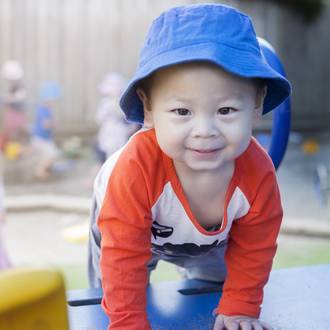Shop
02606
https://www.under5s.co.nz/shop/Hot+Topics+Articles/Child+Development/Growing+resilience+in+your+child.html
Growing resilience in your child
|
Nurturing resilience in young children can help turn a lifetime of key problem solving into positive, confident decisions that build full, positive lives. Children with resilience become brave and curious, trusting that they can do things and are able to push themselves out of their comfort zones to reach their life goals. So, what can we do to help nurture their resilience?
|
You might also be interested in ...
The plus side of play dates
Are play dates really necessary when kids are young? We take a look at some of the benefits and developmental effects play dates can have on older babies, toddlers and pre-school kids when they catch up with their friends.
How gender affects kids learning & play
We take a look at children’s play choices and what we can do as parents and caregivers to help change gender stereotypes and encourage learning without bias.
join usJoin us on social media for all our latest news. |
sign upSign up and receive our latest newsletters. |
|







Throughout our lives, key decisions we make when we’re stressed, underconfident, hurt, angry or scared could impact our life’s path. As parents or early childhood teachers caring for children, we all want the best start for our littlies.
Nurturing resilience in our children is an enormous gift that can help turn a lifetime of key problem solving into positive, confident decisions that build full, positive lives.
Growing resilience in your child
Children with resilience become brave and curious, trusting that they can do things and able to push themselves out of their comfort zones to reach their life goals.
They know that making mistakes are learning opportunities and so they aren’t so afraid to fail. If they learn this in their early years, chances are it will stay with them throughout their adult lives.
So, what can we nurture in a child to give them the know-how to get through life’s difficult moments?
Mistakes and failure are all part of life
We’re not perfect – that includes us! We all make mistakes or have things that don’t work out – especially when trying new things.
As teachers and parents, we let our children know that mistakes and things that don’t work out as we’d planned are all part of everyone’s life and it’s better to have tried than not tried at all.
It’s also a great learning opportunity – what worked? What didn’t work? Could you try it again but do it differently?
Don’t do it for them
Children need to experience some difficulty to develop their problem-solving skills.
As teachers and parents, showing we believe in their ability to work problems out and giving the encouragement to do it, nurtures their problem-solving skills and confidence. It grows their expectation that they can get through life’s adversities.
Constantly stepping in to fix things when we see children in discomfort can weaken their ability to problem-solve and increase their chances of anxiety and withdrawal in the face of life’s difficulties.
Give emotions a name
When children are experiencing big emotions, we can support by asking them to name how they’re feeling. If they’re not sure what they’re feeling, we can describe how they’re looking and sounding to us.
We can invite them to talk about what they’re experiencing and what happened to make them feel like that. We can reassure them that big feelings like this are normal and they will pass.
Support with prompts
When children come to us with problems, we try to resist the urge to give them all the answers. Instead, it’s an opportunity to ask questions to encourage their problem-solving skills.
Can we come up with some ideas together to help sort this out? What might happen if you did this? Or if you did that? Or what do you think you could try?
Healthy risk-taking is good
Healthy risk-taking means taking a risk that won’t result in harm. As teachers and parents, we encourage children to take risks that put them out of their comfort zone, for example, trying a new physical skill or inviting a new friend to play with them.
If something goes wrong, problem-solve with them, letting them know that trying new things can be hard at the beginning, but with time they get easier.
We’re doing this together
By letting children know we are always there to guide them as they make sense of the world around them gives them a sense of security and reassurance.
As teachers and parents of young children, we’re not trying to make a child completely reliant on themselves, we’re there to love and support them, helping them navigate their way through life’s journey.
Be their Role Model
Live your resilience values! By sharing with children a mistake we made and telling them how we problem-solved around it, we show that we too problem-solve regularly in our daily lives.
By modelling this behaviour, when life gets a bit tough for us, we might find advice in an unexpected quarter - our wise littlies might give the great advice that we’ve just given them!
Source: This article was kindly written for us by Michela Homer, BestStart Regional Education Leader www.best-start.org.